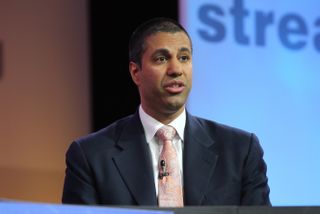Pai to Voice Providers: Block Those Robocalls

FCC chair Ajit Pai has told cable and telecom voice providers they have to start implementing a system to authenticate calls and combat caller ID spooking by next year. Period. That came in letters to 14 voice providers that were a mix of carrot and stick, with the cable voice stick waved at Charter.
The chairman said that an authentication system is critical to protecting against scam robocalls, which he called the FCC's top consumer priority. Pai wants providers to end such spoofing with a system that lets them vouch for the authenticity of the calls. That would also potentially put them on the hook for such scam calls if they all had systems that were supposed to prevent them.
"By this time next year, I expect that consumers will begin to see this on their phones,” said Pai. “Carriers need to continue working together to make this happen and I am calling on those falling behind to catch up," he said in announcing the edict.
He did not say what the consequence would be for those who did not answer that call to action, but made it clear there would be one: "If it does not appear that this system is on track to get up and running next year, then we will take action to make sure that it does.”
Comcast, Charter and Cox all got letters from the chairman.
Pai began the letters to Comcast and Cox with praise for their commitment to implement authentication by 2019, but also a request that they provide the FCC a timeline for deployment by Nov. 19. he thanked both for their "efforts and leadership."
The Charter letter was more pointed. It pointed out that, according to staffers, the company does not have concrete plans to implement an authentication framework, adding: "I hope that is no longer the case." He wants answers to a bunch of questions, also by Nov. 19, including what the impediments are from "signing" calls now and when the FCC can expect that to happen.
Broadcasting & Cable Newsletter
The smarter way to stay on top of broadcasting and cable industry. Sign up below
A charter spokesperson was not available at press time, but the company has weighed in on the issue with the FCC and sounds like it is on the same page as the chairman when in comes to the need for solutions and industry buy-in.
Charter told the FCC back in September, in comments on the commission's inquiry into how best to prevent scam robocalls, that it remained "committed to helping the Commission combat the scourge of this unlawful practice." The company said it had collaborated with the FCC, other providers and consumer groups to "dentify and implement solutions to this problem, including through participation on the Robocalls Strike Force, North American Numbering Council (NANC) working groups, and the Alliance for Telecommunications and Industry Solutions (ATIS)."
"We support the development of objective criteria that providers "can use to identify—and prevent consumers from receiving —illegal and unwanted calls, and we are actively working with our industry partners to develop tools to help us achieve that goal."
In addition, according to an ex parte filing with the commission, which is a required public notification of outside-party contacts, Charter execs say they met with Wireline Competition Bureau staffers back in May. They also say that in that meeting, they expressed Charter's commitment to both protecting customers from unwanted robocalls and to working cooperatively to develop industry standards for an authentication framework, including "discussing plans" for implementing that framework and "some of the barriers that needed to be resolved in order to deploy [it] effectively."
Contributing editor John Eggerton has been an editor and/or writer on media regulation, legislation and policy for over four decades, including covering the FCC, FTC, Congress, the major media trade associations, and the federal courts. In addition to Multichannel News and Broadcasting + Cable, his work has appeared in Radio World, TV Technology, TV Fax, This Week in Consumer Electronics, Variety and the Encyclopedia Britannica.

